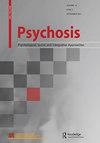A behaviour sequence analysis of goal generation processes in a psychosis rehabilitation sample
IF 1
4区 医学
Q4 PSYCHIATRY
Psychosis-Psychological Social and Integrative Approaches
Pub Date : 2021-11-26
DOI:10.1080/17522439.2021.1988685
引用次数: 0
Abstract
ABSTRACT Background It is suggested that goals are hierarchically organised, with goals at the highest level representing fundamental values and motivations. These abstract goals are said to have a series of sub-goals which represent a means of reaching higher-level goals. While a number of studies have explored goals in the context of psychosis, little is known about idiographic goal generation processes in those experiencing psychosis. Methods Using a Behaviour Sequence Analysis approach, the aim of the current study was to assess the feasibility of the goal task for use with individuals experiencing psychosis. A total of 73 adults receiving care from UK rehabilitation services completed a goal task designed to elicit higher-level goals. Results Results indicated that the goal task may be a feasible tool to support those experiencing psychosis to generate lower- and higher-level goals. Discussion The goal task utilised in the current study may therefore be a valuable goal generation tool for use by clinicians.一个精神病康复样本目标产生过程的行为序列分析
摘要背景有人认为,目标是有层次的,最高层次的目标代表基本价值观和动机。这些抽象目标被称为具有一系列子目标,这些子目标代表了实现更高层次目标的手段。虽然许多研究在精神病的背景下探索了目标,但对精神病患者具体的目标生成过程知之甚少。方法采用行为序列分析方法,本研究的目的是评估目标任务用于精神病患者的可行性。共有73名接受英国康复服务的成年人完成了一项旨在引发更高层次目标的目标任务。结果结果表明,目标任务可能是支持精神病患者产生较低和较高目标的可行工具。讨论因此,当前研究中使用的目标任务可能是临床医生使用的有价值的目标生成工具。
本文章由计算机程序翻译,如有差异,请以英文原文为准。
求助全文
约1分钟内获得全文
求助全文
来源期刊
CiteScore
2.20
自引率
8.30%
发文量
36

 求助内容:
求助内容: 应助结果提醒方式:
应助结果提醒方式:


